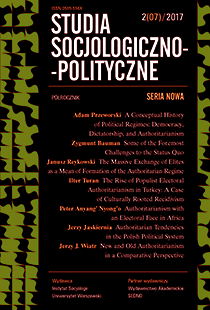New and Old Authoritarianism in a Comparative Perspective
New and Old Authoritarianism in a Comparative Perspective
Author(s): Jerzy J. WiatrSubject(s): Politics / Political Sciences, Politics, Social Sciences, Law, Constitution, Jurisprudence, Constitutional Law, Human Rights and Humanitarian Law, Political Theory, Political Sciences, Civil Society, Governance, Public Law, Sociology, Government/Political systems, Electoral systems, Political behavior, Politics and law, Politics and society, History and theory of political science, Comparative politics, Social Norms / Social Control, Sociology of Politics, Sociology of Law
Published by: Wydawnictwo Akademickie SEDNO
Keywords: authoritarianism; democracy; election; leadership; parties; rule of law
Summary/Abstract: The third wave of democratization, unlike the first and the second, has not been followed by the reverse wave. However, in several countries (Russia, Belarus, Turkey, Hungary, Poland) democratically elected leaders interpret democracy narrowly, as the rule of majority only. Other conditions for democratic government (the rule of law, protecting human rights) are ignored. Such system of government differs from the authoritarian model (as defined by Juan J. Linz) and can best be called “new authoritarianism”. Poland is a special case because, while after the presidential and parliamentary elections of 2015 authoritarian practices became common, the hold on power by the ruling party (“Law and Justice”) is relatively weak. Future development of Polish politics depends mostly on the next parliamentary (2019) and presidential (2020) elections.
Journal: Studia Socjologiczno-Polityczne. Seria Nowa
- Issue Year: 7/2017
- Issue No: 2
- Page Range: 123-137
- Page Count: 15
- Language: English

